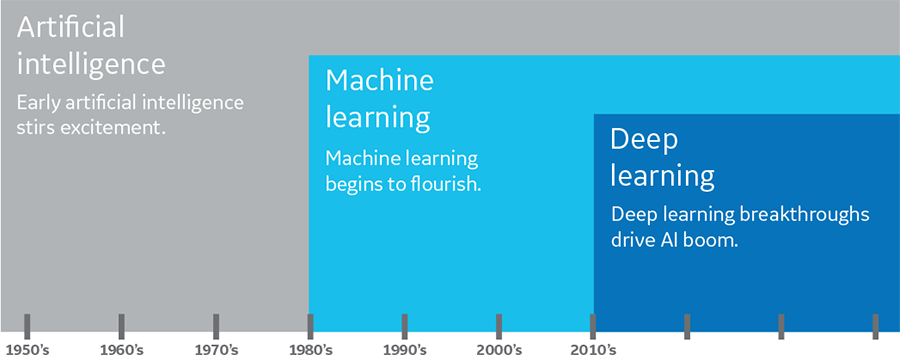GE Healthcare
Artificial Intelligence by Edison
Understanding AI : Machine Learning vs Deep Learning
The difference between applied intelligence and artificial intelligence is a simple nuance with the way a device operates. In fact, the two terms may often be used inter-changeable. Both can propel medical imaging toward more personalized care, and, as such, should be understood by healthcare professionals.
- Applied intelligence refers to the software system that enables artificial intelligence.1 In the healthcare field, it helps to extract and interpret data across healthcare systems, devices and imaging equipment. This may help provide actionable insights, as well as enhance and augment decision making. In everyday life, applied intelligence may be the programs that virtual assistants run.
- Artificial intelligence, or AI, refers to the device’s ability to mimic human intelligence or to perform tasks that have traditionally required human thought.1 The branch of computer science that deals with artificial intelligence attempts to design programs that can complete certain actions that software programs may have been incapable of before, such as those involving visual perception, speech recognition, and decision making. This is possible, because the program design allows the device to continue to learn. Virtual assistants may be considered artificial intelligence.
- Machine learning enhances the system’s ability to automatically learn and improve from experiences, or data, without being explicitly programmed.
- Deep learning refers to a network of systems that are capable of learning unsupervised from unstructured or unlabeled information.

DeepLearning by Edison
Hospitals are generating massive amounts of healthcare data. This data requires analysis to get the right information to the right person at the right time. Edison Applications leverage analytics—such as artificial intelligence, machine learning and deep learning algorithms and models—to identify insights, patterns and suggestions. These insights help enhance and augment clinical, financial and operational decision-making.
Edison is GE Healthcare’s intelligence offering comprised of applications and smart devices built using the Edison platform. Edison enables GE Healthcare to integrate and assimilate data from disparate sources, and apply advanced analytics and AI to transform the data to generate powerful insights.
Built on top of existing workflow applications and devices, GE Healthcare inserts analytics directly into these devices and workflows—at the point of maximum impact. The result makes your new and existing systems smarter, by increasing their performance and improving their efficiency, enabling you to make better decisions faster.
Edison Applications are designed to help you optimize workflow, reduce errors and waste, and control costs, allowing you to focus on patient care.
AI Technology
MRI

Impact of DeepLearning inside Advanced Applications in MRI
There are three main areas for AI to be developed in medical imaging: intelligent applications, intelligent scanners and intelligent services. Each aspect could potentially improve and streamline work for the radiology department, leaving time to focus on and interact with the patient.
Intelligent applications may help staff make decisions faster throughout the use of actionable insights. These insights may be provided by software solutions and applications that utilize machine learning or deep learning algorithms.
In fact, Dr. Yaou Liu from the department of radiology at Beijing Tiantan Hospital attempted to ease the workload for the radiologists by employing one of these deep-learning algorithms. The algorithm was meant to help identify abnormal MR images, select the best protocol for detected diseases and direct patient to the correct department for treatment. The team uploaded a total of 5,806 brain images, 4,639 of which were used to train the algorithm. The rest of the images were to test the algorithm’s ability to detect potential tumors, ischemic cerebrovascular disease and multiple sclerosis. During the test, the algorithm had a sensitivity of 85%, specificity of 96% and accuracy of 94%. Radiologists still reviewed the results to confirm or correct them.
Automated slices on MRI
Automated slice selection and deep learning have enabled radiology to become more patient friendly through the use of AI. Reduced scan times due to AI assistance may help more patients be able to have MRI studies done. Automated slice selection may allow radiographers to interact with patients more, which could help the patients feel more at ease. With these software programs, medical imaging may be easier for the patient and the radiologists, just as AI has made technology more accessible for those who have virtual assistants. In the future, it is possible that AI will continue to ease the often overwhelming workload for radiology departments.
More details : http://www.gesignapulse.com/signapulse/Store.action
Computed Tomography
For years, low dose was the benchmark for image quality by which every CT image was held. We helped set the standard for low-dose imaging back in 2008 with an iterative reconstruction technology capable of lowering dose by 50 percent. Over the years, the benchmark has changed. While dose is still important, radiologists are looking for an image texture reminiscent of the text-book quality images they studied in medical school. To that end, we’ve introduced Deep Learning Image Reconstruction, what we feel is the future of image quality. It uses artificial intelligence to combine the low dose of iterative reconstruction with a “classic-looking” image texture.
More details available on GE Healthcare website – https://gehealthcare.com


